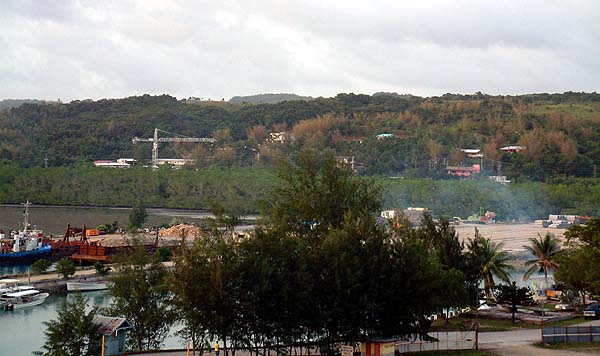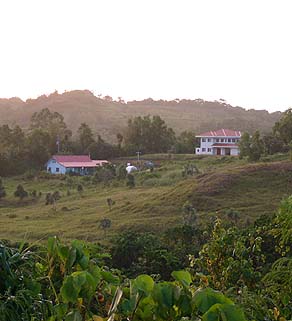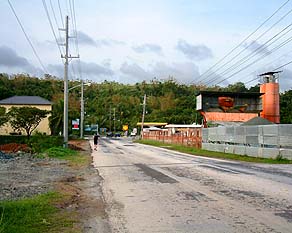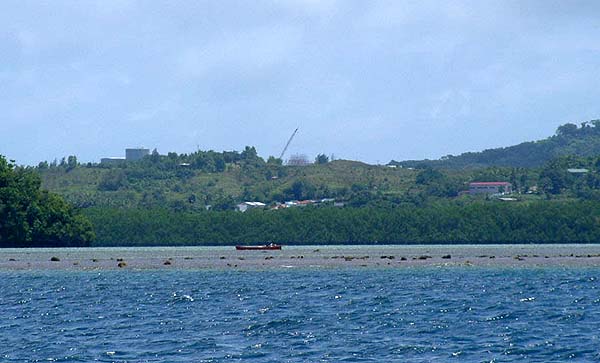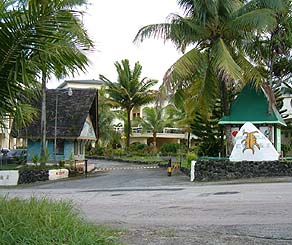 |
 |
 |
 |
||||
|
|
|
|
|
|
|
|
|
|
|
|||||||
|
|
|
|
Development taking place in Airai State, near the Japan-Palau Friendship Bridge.
|
|
“The trend in Palau is moving more toward a cash-economy system," Johnson says, "so people are moving away from their traditional villages to Koror or places closer to Koror, like Airai State. So Airai State is becoming more or less part of the center of commerce in Palau. We have the airport here. We have a hotel here. We have the water, the dam here. And thre are residences for non-Airai people here and the bridge connects Airai to Koror. So in away it is becoming a part of the modern Palau."
|
||
|
|
||
“In terms of employment, you can perhaps say that Airai is becoming a suburb of Koror, the commercial center of Palau, because it is the closest state to Koror. So in the future, a lot of people who will work in Koror will have to establish their residences at the most convenient and closest area to Koror, and that just happens to be Airai. "Already we can see houses springing up on the hills near the airport. So Airai will become perhaps not so much a suburb but a place that is less traditionally composed, and become more like Koror where it’s a multi-village place. "When I say multi-village, I mean people from different places in Palau will relocate in Airai State. It will neutralize the traditional rivalry between the various states of Palau. Traditionally people who live in one village are from that village either by birth or custom or by marriage. But now I think that is going to change. It is going to be by convenience."
|
|
|
“I think it is threatening. It is alarming,” Walter says. “Airai State belongs to the people of Airai. And even if the government—Airai’s governor and the legislature—open the door for more people, at least they should get the community involved, let them know what is going on. At least ask them if they like the idea and how much they like it. "But I feel we are not ready to open the door for a lot of other people. Everything we have is already congested here. We have very limited resources, even for the built-up facilities, the roads. We don’t have a main sewer system over there. In the whole Airai, we just use septic tanks. We even have the problem with our dump site. It was supposed to be temporary."
|
|
|
|
|
“Airai is not like in Koror. I don’t know of any good planning for the state—zoning different areas—that would designate what would be a good housing area, an industrial area and so on. We just don’t have a good plan for a lot of people coming in, and I don’t think we are ready. And we don’t pay attention to the roads and sewers and the dump site. “And then these new people are not voters of Airai. They are from Koror or nearby states, Aimeliik, all the way to the end—the various villages of Babeldaob. They work in Koror. There are people from Aimeliik, Ngchesar, and all over, coming to Airai because it’s a developing area in comparison to the rest of Palau. That is why people want to come there. Even before it was different and our leaders were coming over here to live."
|
||
|
|
||
“The way our system works, Airai’s annual budget from our National Congress is based on the population. So it is limited for only the number of people in that state. The state would probably use this for the maintenance of their state’s road and everything here. "Then you put extra people over here, crowding these , and so we are losing out. Because these new people are sharing our resources with us, but their presence here does not contribute to our budget allotment. They’re congesting all the roads and infrastructure here, using everything available here, yet they are not counted in our budget over here."
|
|
|
“The newcomers are leasing what is probably clan lands, although they haven’t really been returned to the clans. On account of the Japanese policies that took a lot of land, we were suppose to have a public land authority. All the land that was forcefully taken by Japanese should be tried and returned to the rightful owners. Airai state is supposed to make sure all the such lands in Airai are properly returned. “But what has happened in many states of Palau is that the state
governments, they want to use those lands as their assets, so they don’t
want to return them to the village and individual owners.
|
|
|
|
“I don’t know what the state government and legislature have in mind. But if it is good, then they should let the people from Airai, the citizens over here, know what they are planning to do—who will be our neighbors and what they can bring. Maybe the new people will contribute just lease rentals. But we have never had that shown to us, so we don’t know just how much our government is making from this."
|
||
|
|
||
|
|
|
|
|
|

|
| Airai Home | Map Library | Site Map | Pacific Worlds Home |
|
|
|
|

|
|
|
|||
| Copyright 2003 Pacific Worlds & Associates • Usage Policy • Webmaster |
|||
